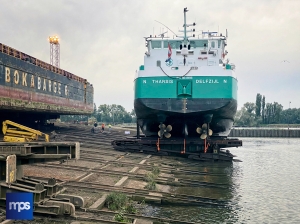


(Posted on 11/07/21)
Air lubrication for marine vessels is a developing solution that will radically reduce fuel consumption and environmental impact. Having acquired a minority stake in Marine Performance Systems B.V., a Rotterdam-based maritime technology company, Alfa Laval will be instrumental in making this long-sought technology a commercial reality.
The idea of using bubbles to reduce a vessel’s friction – which is the largest driver of fuel consumption as it moves through the water – has existed for well over a century. Nonetheless, it has taken time to realize. Alfa Laval has chosen to invest in Marine Performance Systems, whose unique method of producing bubbles with fluidics is a breakthrough that will reduce fuel consumption by 8–12% at a vessel’s normal service speed.
“The use of fluidics creates a larger air layer of superior quality,” says Frode Lundsteen Hansen, who founded Marine Performance Systems in 2018 with innovators Pieter Kapteijn and Fulko Roos. “Our FluidicAL technology enables truly effective air lubrication, with immediate environmental benefits and substantial savings for shipowners. Alfa Laval shares our belief that this technology will facilitate the transition to green shipping.”
“The investment brings Alfa Laval full circle, since air lubrication technology for marine vessels was first pursued and patented by our founder Gustav de Laval in 1883,” says Sameer Kalra, President, Alfa Laval Marine Division. “The technology did not result in any product in his time, but our founder’s vision has new importance today. Air lubrication will smooth the marine industry’s path to a sustainable future.”
By reducing the amount of fuel burned, air lubrication will have a direct effect on greenhouse gas emissions. In addition, it will provide critical fuel cost savings for shipowners, who need to offset the expense of rapidly shrinking their environmental footprint.
“Fleets cannot be replaced overnight, so existing vessels will need to rely on clean-burning fuels to lower their emissions,” Lundsteen Hansen explains. “In a low-margin industry where fuel represents up to 60% of a shipowner’s costs, the premium price of those fuels is a heavy burden. With very small means, air lubrication can provide significant relief.”
Indeed, the patented FluidicAL technology requires no structural modifications or vessel recertification, which makes it ideal for retrofitting as well as for newbuilds. Compatible with any vessel size and any fuel type, it comprises evenly spaced bands of oscillators under the vessel’s hull. Using high-efficiency fluidics, each oscillator produces tens of thousands of microbubbles per second, creating a stable, uniform layer of air that significantly reduces friction between the hull and the water beneath.
AtoB@C Shipping, a subsidiary of ESL Shipping, has announced the successful delivery of Fleximar, the... Read more
Western Bulk, together with reputable Norwegian partners A/S J. Ludwig Mowinckels Rederi, Premium Maritime... Read more
Pacific Basin Shipping Limited, one of the world’s leading dry bulk shipping companies, has announced... Read more
Columbia Group anticipates a period of strong expansion as an increasing number of international shipowners... Read more
Norse?Ship Management has expanded its use of Smart Ship Hub’s high frequency sensor data and... Read more
As the maritime industry gears up to welcome the IMO’s STCW bullying and harassment training amendments... Read more
NORDEN has acquired the cargo activities of Taylor Maritime in Southern Africa (previously operated... Read more
Philippos Ioulianou, Managing Director of EmissionLink, has warned the IMO’s decision to delay... Read more
VIKAND has highlighted the need for cultural change in the maritime sector as reports of bullying, harassment... Read more
The maritime industry is experiencing a period of significant transformation, driven by rapidly evolving... Read more